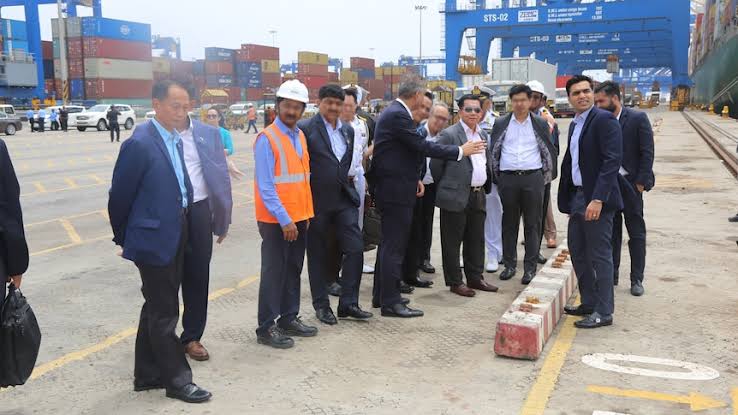Melbourne (Chindwin): After much has been criticised and called out by activist groups, finally, India’s Adani Port has withdrawn its partnership with the Myanmar military conglomerate Myanmar Economic Corporation (MEC). Their decision to divest comes amid the increasing Myanmar military attacks against people in Sagaing and Magway Regions and Chin State in north-western Myanmar.
The Australian Centre for International Justice (ACIJ), Justice for Myanmar (JFM) and Stop Adani stated that they cautiously welcomed Adani Ports’ plans to divest from their Myanmar container port business, which is a testament to grassroots campaigns for corporate accountability in Myanmar and Australia, and the work of the UN Independent International Fact-Finding Mission on Myanmar (FFM)
Since the new evidence of payments to the MEC and the company’s direct relationship with Senior General Min Aung Hlaing was revealed in March 2021 by ACIJ and JFM, the company business dealings in Myanmar and Australia have severely dented the company’s reputation making Adani Ports complicit in the ongoing atrocities committed by the Myanmar junta across the country.
In April 2021Adani Ports was removed from the Dow Jones Sustainability Index after human rights and environmental groups submitted a case for review due to Adani Ports’ links to the Myanmar port project and the Adani Carmichael coal project in Australia.

Justice For Myanmar spokesperson Yadanar Maung said, “Adani Ports’ plan to divest shows community and investor pressure works. Business with the terrorist Myanmar military does not pay. Adani Ports should never have gone into business with MEC, knowing they would be complicit in the Myanmar military’s atrocities. Adani Ports must now find a way to exit responsibly by mitigating the impact on their Myanmar workers and recovering what they can of their $90 million payment to MEC so they do not leave a windfall for the terrorist Myanmar military. Contractors on the port, including ITD Cementation India and Singapore firms HSL Constructor Pte Ltd and Asia Infrastructure Ptd Ltd must also ensure they cut all ties with the Myanmar military. Continuing work to develop the port creates an asset that the Myanmar military will use to further finance their campaign of terror.”
“While we recognise that Adani Ports has finally made the right call in Myanmar, Adani Group continues to do harm to the climate and communities elsewhere. We stand in solidarity with First Nations people, the Wangan & Jagalingou and all Australians in opposing Adani’s destructive Carmichael mine project”, she added.
Rawan Arraf, Executive Director at the Australian Centre for International Justice said:
“We welcome the decision by Adani Ports to disengage from their deeply flawed investment in Myanmar. It was untenable for Adani Ports to maintain business with a sanctioned entity and after sustained pressure from the public and investors. It is a testament to the coordinated work of activists in Myanmar who were joined by campaigners in Australia and abroad to expose its dealings in Myanmar.

For years, Adani Ports ignored the clear and direct public warnings before and after it entered into business in Myanmar. It is positive that Adani Ports has shown an apparent willingness to engage in human rights due diligence obligations by divesting from Myanmar.
However, there are massive failings connected to the Adani Group’s operations in India and Carmichael that it must reconcile. The impacts on the human rights of the Traditional Owners, the Wangan & Jagalingou are severe, they face destruction of their sacred places and cultural heritage. Adani Group companies must respect the rights of the Wangan & Jagalingou people and shelve its destructive Carmichael coal mine.”
Pablo Brait, Campaigner, Market Forces said,“Adani finally announcing that it will walk away from its business with the Myanmar military shows that with enough pressure it can be convinced to do the right thing. The next project it needs to walk away from is the climate-wrecking Carmichael thermal coal mine. Building a new coal mine at a time when coal use needs to be urgently phased out sabotages efforts to limit global warming.”
These small successes in both the West and countries like Myanmar, which is on the frontline of human rights abuses by their national government, point to the opportunities and importance of community and civil society pressure to change corporate behaviour. It also demonstrates the lack of international enforceable norms and laws that would safeguard human rights of First Nation people and minorities the world over.
Patrick contributes to this report and editing by Gerhard.




